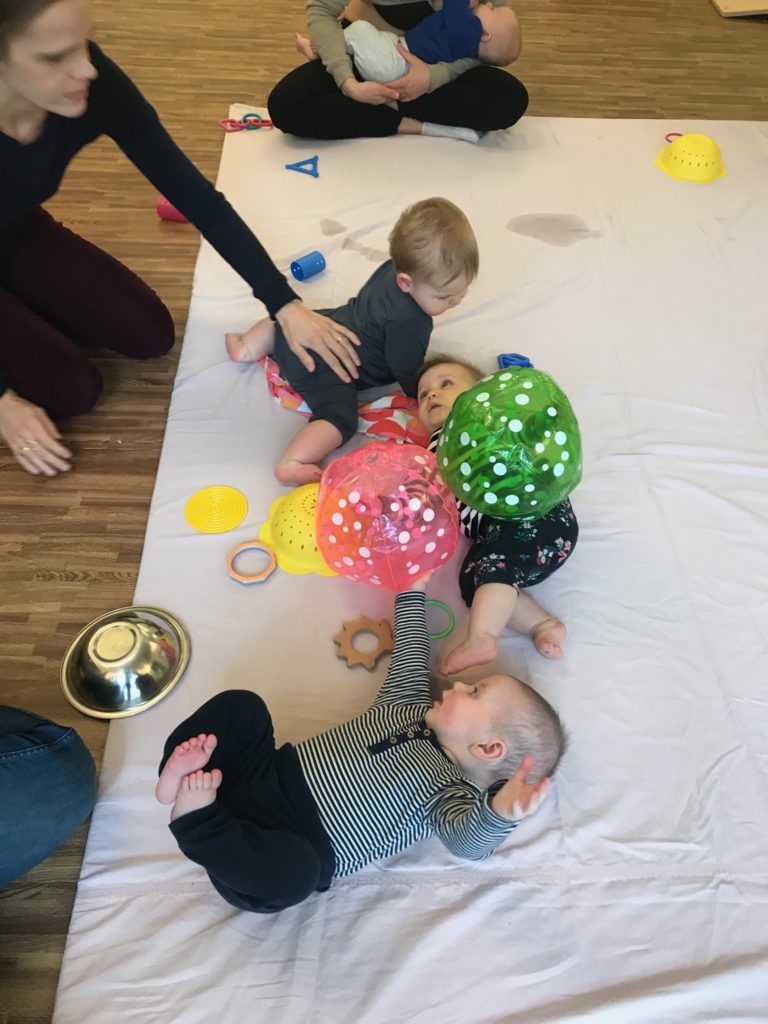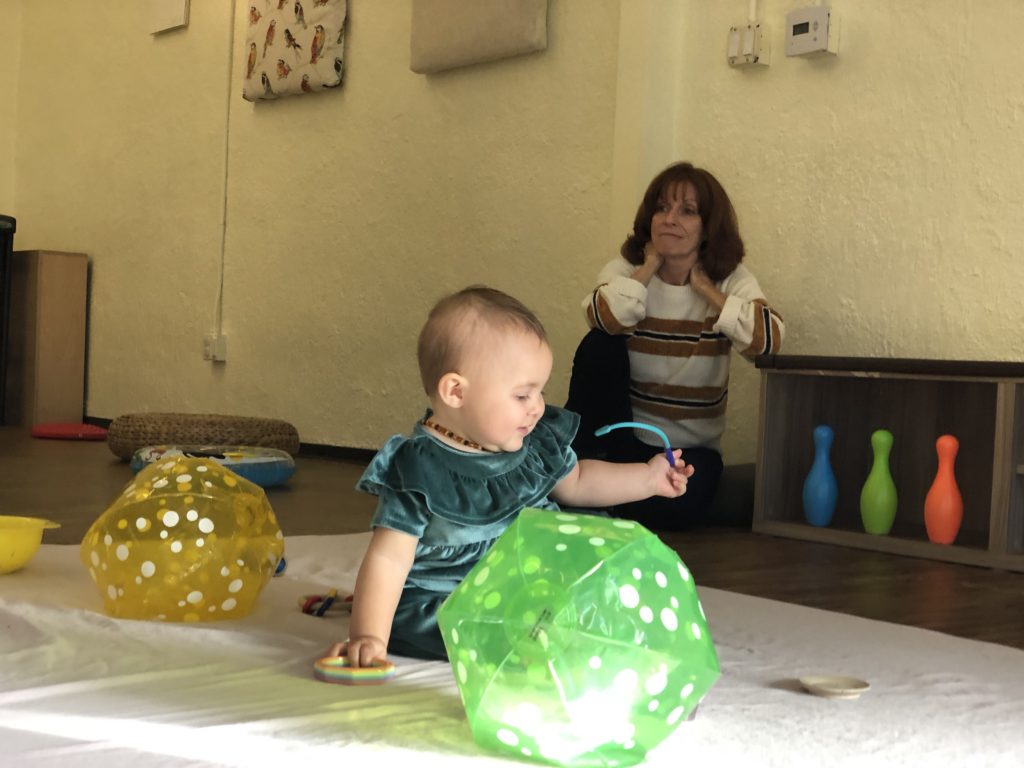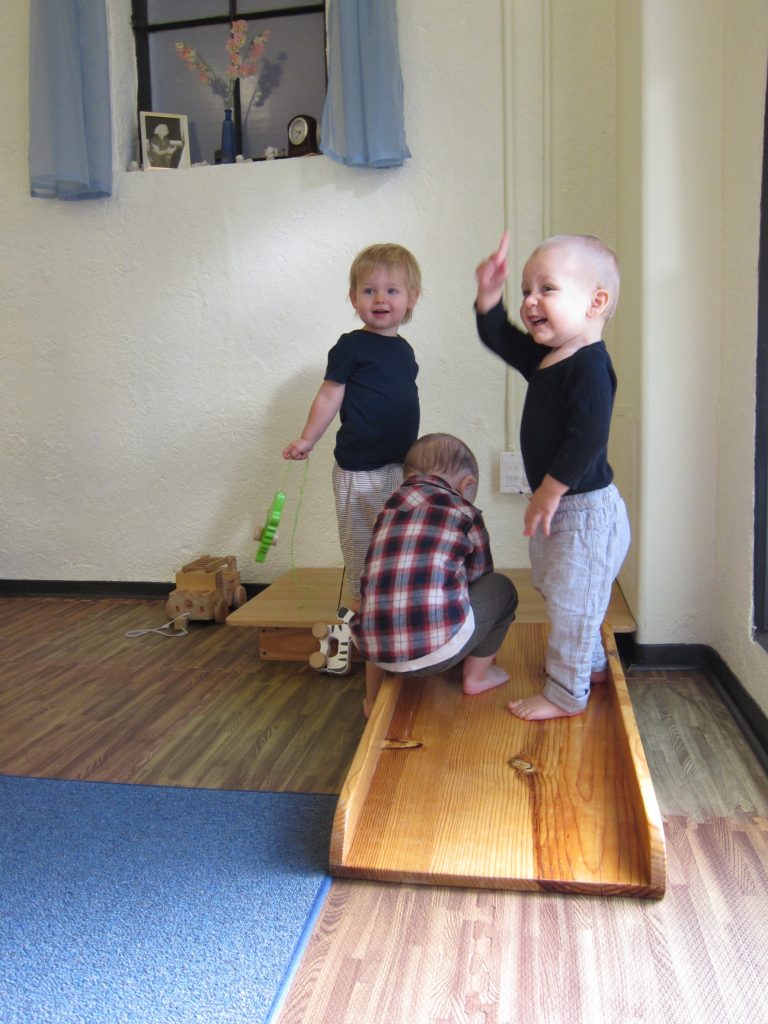
How often have I observed parents reacting with mild horror when their 6 month old takes a toy from another baby…as though they ought to have the same moral perspective adults do. It’s actually one of the really fun parts of my job as facilitator of parent-infant classes, because it is really calming to parents to learn that it is okay for their child to take toys. I help them notice that, in fact, babies take toys from each other without the other getting upset. They seem more interested in the other baby and their actions than in the toy. They study each other’s faces, first connecting with eyes and hands, then mouths, and as they become mobile, by climbing over each other, then cruising the same toy shelf.
Often, one object seems to make it around the room, with each getting a turn, as if there were a consensus about which was the “toy of the day.” (We call them objects, not toys, because many of the materials are real “stuff” rather than something concocted by toy manufacturers, although we do have some classic open-ended “toys” such as dolls, balls and wheeled vehicles.) There is a particular object, which is definitely not a “toy,” that has been the object du jour more than once in one of my groups. It’s a turquoise and purple silicone and plastic “thingy” that was meant to hold a set of measuring cups together. It’s been a favorite “chewey” for years, and some parents have even gone out and bought the set of measuring cups just to get the “thingy.” Many babies have literally cut their teeth, socially speaking, with this one-of-a-kind classroom staple. Early childhood education traditional “wisdom” says to have multiples of favored objects, and to some extent, I agree. I wouldn’t have just one doll or just one truck in a room of toddlers. But it’s okay for children to have to negotiate for a turn sometimes. I have not gone out and bought another set of measuring cups, just for the “tie.”

By the time they have progressed to full, sturdy toddlerhood, they have passed toys back and forth many times, and in so doing, I believe, have internalized the notion that losing a toy now doesn’t mean it will be lost forever. As Magda said, “Sometimes you win, sometimes you lose,” and this comes to feel normal.
My first class of the week, which I always look forward to, is made up of a group of 8 toddlers 18-20 months old, and their devoted parents. These families have really bonded and the children see each other outside of the weekly class setting. They know each other, and benefit from the predictability of knowing playmates over time, and the children seem to like the other parents as well. This is why we like to keep the same group together over many months. These families have been together since the babies were 3 or 4 months old. They say each other’s names and their eyes light up when their playmates arrive. I think it is safe to say they are friends.
They sometimes play together with the same objects. This week, there seemed to be an equal number of times they cooperated and had conflicts. There are two or three trucks or busses with strings for pulling, and they are very popular toys. And it’s really easy to grab the truck someone else is pulling by the string. Up to a certain age, this was not terribly upsetting, but as they settled into serious toddlerhood, these incidents have sometimes led to tears and anger. We are not inclined to intervene because we think they need to learn about human conflict from all sides in the low-stakes world of play in order to develop genuine empathy. In the last couple of weeks, I’ve seen some conflicts resolve in beautiful ways.

Last week, the youngest child in the group, Leno, has begun to feel his power, and started off in class taking all the trucks away from his patient pal, Rainer. Rainer was a little troubled by this, but found a way to roll with it. In fact, he began bringing all the cars to Leno as well! This seemed to satisfy them both, and afterwards, Leno seemed less compelled to take away objects for the rest of the morning. Rainer, for his part, had the authentic satisfaction of an altruistic act. Both boys benefitted from our non-intervention. If we had insisted on justice on our own terms, it would have been a much less complex learning opportunity.
The parents and I felt our hearts swelling with pride and joy…and maybe a little relief. Conflicts between toddlers are inevitable, and instructive…but no one would say it’s their favorite part of class, until such moments remind us this is why we gather.